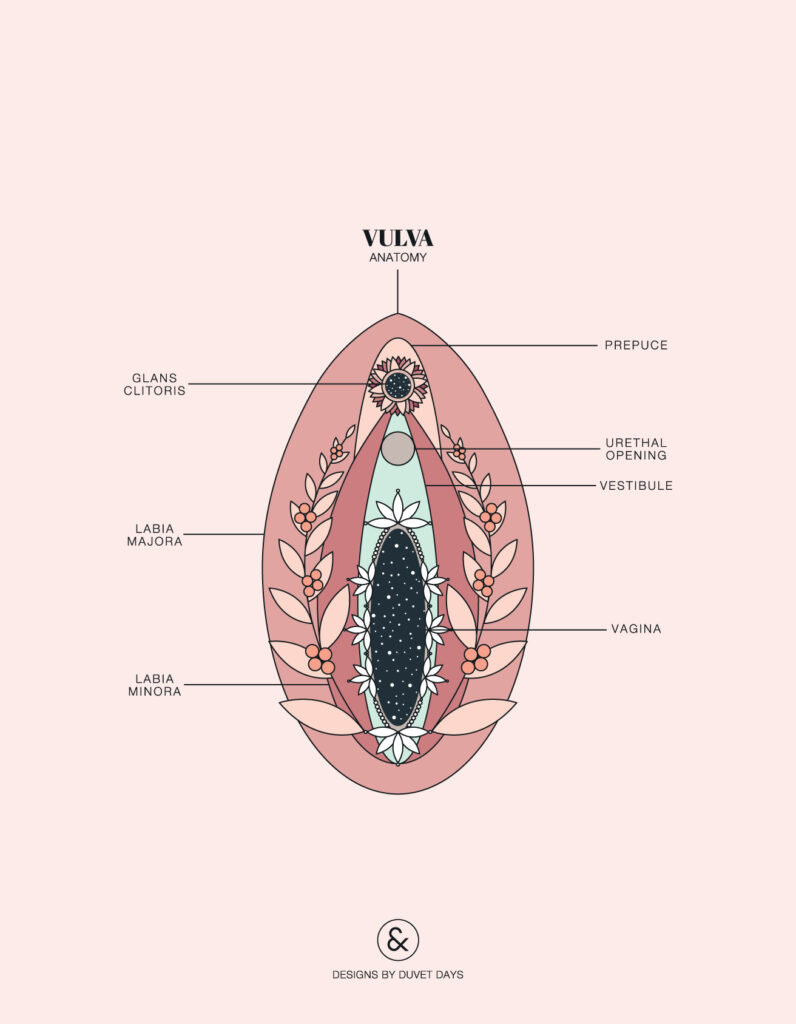Why does sex hurt? Talking about dyspareunia
"You'll get used to the pain."
#howaboutno.
No one wants to talk about painful sex, but it happens in 3 out of 4 women! Its fancy name is dyspareunia, and can be either temporary or long-term.
Why does dyspareunia happen?
According to the experts, dyspareunia is not its own health condition. It's a symptom that occurs alongside something else. There can be many reasons why someone may experience painful sex.
They include:
-
Inadequate lubrication
-
Postpartum dyspareunia
-
Vaginal atrophy
-
Psychosexual causes
-
Interstitial cystitis
-
Pelvic adhesions
-
Retroverted uterus
-
Uterine myomas
-
Pelvic floor issues
Risk Factors for dyspareunia
-
Young age
-
Education below a college/university degree
-
Poor to fair health
-
Emotional distress
-
Stress
-
Decrease in household income
Where does dyspareunia happen?
Let's review the vulvar anatomy real quick (mostly because I love this image):
-
VULVA: Is the external genitalia, surrounding the opening to the vagina. It includes the prepuce, clitoris, urethral opening, vulval vestibule, labia majora, labia minora, and the vaginal opening.
-
VULVAL VESTIBULE: part of the vulva between the labia minora into which the urethral opening and the vaginal opening open.
-
VAGINAL OPENING: Is the opening to the vaginal canal.
-
PERINEUM: Not shown in this image, but it is the area between the vulva and anus.

Pain might be felt in the vulva, vestibule, vaginal canal, or perineum. It can also be felt in the lower back, uterus, or bladder as well.
Superficial or insertional dyspareunia
Sharp, burning or stinging pain at or near the vaginal opening, experienced on penetration. This can happen with vulvodynia, vaginismus, infections, and more!
Deep dyspareunia
This pain is felt within the pelvis, and is associated with deep penetration into the vagina. It can be due to endometriosis, surgery, pelvic tumours or inflammatory diseases, and more. Certain sex positions may also elicit pain, especially if the penis makes contact with the cervix.
Classification of dyspareunia
PRIMARY You've experienced pain the first time you've had sex and it has continued each time after.
SECONDARY: You've had sex before and it wasn't painful. But you are now experiencing pain during sex. May be due to an underlying condition.
Naturopathic approach to dyspareunia
Because dyspareunia is a symptom and not a disease, Naturopathic Doctors will aim to discover the root cause of this symptom. This usually involves a:
-
Detailed health history
-
Examination - abdominal and vaginal
-
Blood work (if necessary)
NDs will create a treatment plan based on their findings. For example: if yeast infections are found to be the root cause, then that treatment plan will commence. This will be different if endometriosis is found to be the the reason why painful sex keeps happening.
Final Thoughts
A woman's mental and physical health can be negatively impacted by dyspareunia. Not to mention the effects on her body image, relationship with her partner and desire to conceive. It may lead to sexual dysfunction disorders down the line as well. If you are experiencing pain with sex, now is the time to find out why it's happening, and work on getting this symptom to go away for good. If you're looking for a holistic approach, consider working with a Naturopathic Doctor.
If you found this information helpful, please sign up for my monthly newsletter called The Flow for great and informative content like this!
References
Seehusen D, Baird D, Bode D. Dyspareunia in Women. Am Fam Physician. 2014;90(7):465-470.
Cassis C, Mukhopadhyay S, Morris E. Dyspareunia: a difficult symptom in gynaecological practice. Obstetrics, Gynaecology & Reproductive Medicine. 2018;28(1):1-6. doi:10.1016/j.ogrm.2017.10.006.
